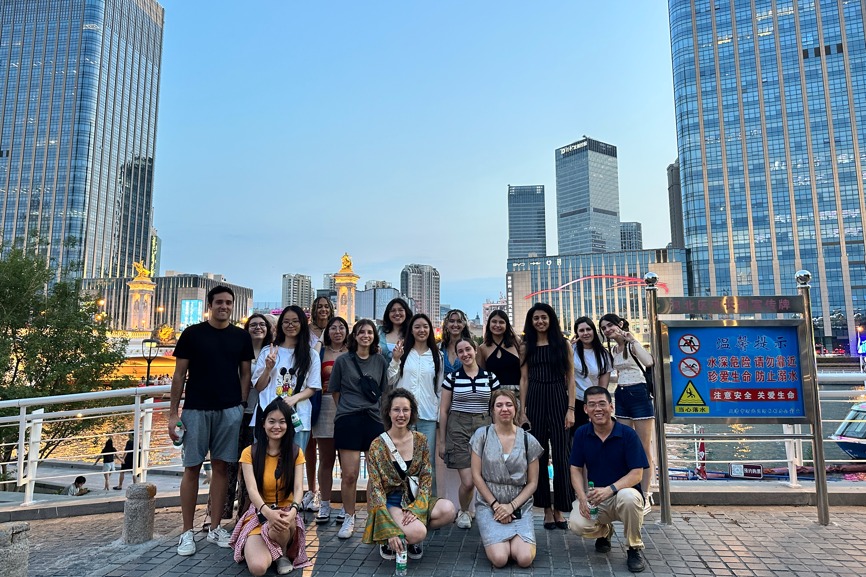AI can help create global citizens, intl English educators say

Educators around the world are actively integrating artificial intelligence into English language classrooms to significantly enhance cross-cultural communication, the group said during a gathering for global English educators held in Beijing.
Teachers from Kazakhstan, Vietnam and China said they have used AI tools to simulate authentic conversations with diverse cultural perspectives, provide instant access to information about global customs and traditions, and create immersive scenarios like role-play in virtual settings.
This allows students to move beyond textbook learning, practice real-world language application, and develop deeper empathy and understanding of different cultures, effectively using English as a bridge to connect with the wider world, they said during the 2025 Global English Education China Assembly.
While recognizing AI's power as a transformative tool for delivering content, personalizing practice, and offering efficient feedback, the teachers strongly affirm that the human educator remains irreplaceable in inspiring students, providing emotional support, guiding critical thinking, and contextualizing learning within meaningful human experiences and values, they said.
Kazakh English teacher Assira Sadykova from IT School-Lyceum No 50 observes that AI can help students explore and practice cultural diversity in English lessons, simulating real conversations with people from different cultural backgrounds.
"This helps learners build empathy and tolerance," she said, emphasizing that understanding cultural diversity is necessary for successful communication. She noted that teenagers and young learners are active users in the digital space, so schools should help them become respectful global citizens who appreciate cultural differences.
Vietnamese English educator Vu Thi Minh Trang, from Archimedes Academy Primary School in Hanoi, explained how AI contributes to cultural learning by exposing students to diverse cultures worldwide. "By suggesting videos, stories, and images depicting life in English-speaking countries, AI helps students grasp the practical use of language in real-life scenarios," Trang said.
Ge Bingfang, a senior English teacher in Zhejiang province, highlighted the immersive aspect, stating that AI offers immersive, real-time cross-cultural experiences, enabling scaffolded cultural immersion.
Meanwhile, Xiao Tingting, English teacher at Beijing No 161 High School, pointed out AI's role as an information resource. She said AI can offer real time answers to questions about different countries' culture, covering history, customs or cuisine. Thus, it acts as a knowledgeable teaching assistant.
Putting theory into practice, the teachers shared how they actively incorporate AI into their daily classroom routines. Sadykova said she uses AI to make lessons more engaging and relevant. Trang said AI helps her create lesson plans, generate activities, and adjust materials for different levels. Tools like ChatGPT save time and make learning interesting. "I support AI in teaching, provided it doesn't replace real interaction," she added.
Xiao uses AI tools for practice and speaking exercises. AI assists in test systems, lesson prep, quizzes, and multimedia creation. "I invite students to ask AI questions in English during class. It's an around-the-clock personal trainer," she said.
Despite that AI is constantly involved in daily teaching, the teachers are confident that they won't be replaced by AI even with its rapid advancement. Sadykova said AI offers quick information but can't help build soft skills or create a supportive environment. "Teachers guide, inspire and respond to individual needs --- something that AI, at least for the moment, can't do," she said.
Trang said teachers do more than give answers. "We guide discussions, ask follow-up questions, and connect lessons to students' lives. We provide emotional support and a human learning environment. AI lacks empathy, judgment, or creativity. Teachers remain central; collaboration with AI is ideal," she said.
Ge said teachers make meaning in communication. AI can't read cultural discomfort or spark 'aha!' moments. "Education hinges on human connection --- inspiring students and adapting to teachable moments," he said.
Xiao said English courses nurture moral and intellectual growth via human interaction. "Teachers must be role models in learning and life values --- AI cannot replace this," she said.
- AI can help create global citizens, intl English educators say
- Math labs unveiled in 2025 World AI conference
- Shi Yongxin under probe for alleged criminal offenses
- Seal carving exhibition opens for Beijing Central Axis' first heritage anniversary
- Hawaiian students and teachers experience Hainan culture
- Search underway after van goes missing in North China




































